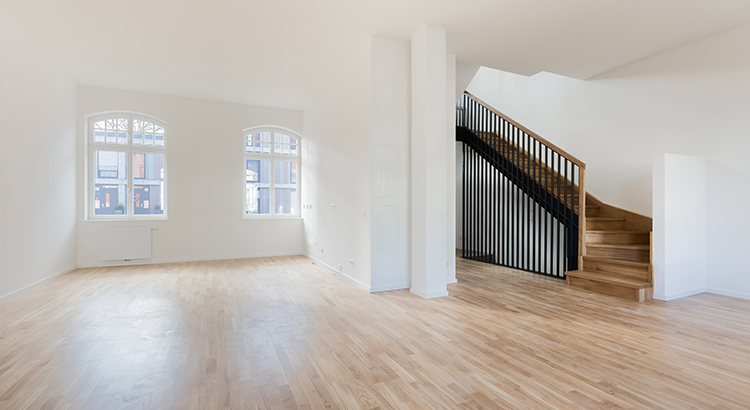
How Much Time Do You Need To Save for a Down Payment?
One of the biggest hurdles homebuyers face is saving for a down payment. As you’re budgeting and planning for your home purchase, you’ll want to understand how much you’ll need to put down and how long it will take you to get there. The process may actually move faster than you think. Using data from the U.S. Department of Housing and Urban Development (HUD) and Apartment List, we can estimate how long it might take someone earning the median income and paying the median rent to save up for a down payment on a median-priced home. Since saving for a down payment can be a great time to practice budgeting for housing costs, this estimate also uses the concept that a household should not pay more than 28% of their total income on monthly housing expenses. According to the data, the national average for the time it would take to save for a 10% down payment is right around two and a half years (2.53). Residents in Iowa can save for a down payment the fastest, doing so in just over one year (1.31). The map below illustrates this time (in years) for each state: What if you only need to save 3%? What if you’re able to take advantage of one of the 3% down payment programs available? It’s a common misconception that you need a 20% down payment to buy a home, but there are actually more affordable options and down payment assistance programs available, especially for first-time buyers. The reality is, saving for a 3% down payment may not take several years. In fact, it could take less than a year in most states, as shown in the map below: Bottom Line Wherever you are in the process of saving for a down payment, you may be closer to your dream home than you think. Let’s connect to explore the down payment options available in our area and how they support your plans.

What’s the Difference between an Appraisal and a Home Inspection?
If you’re planning to buy a home, an appraisal is an important step in the process. It’s a professional evaluation of the market value of the home you’d like to buy. In most cases, an appraisal is ordered by the lender to confirm or verify the value of the home prior to lending a buyer money for the purchase. It’s also a different step in the process from a home inspection, which assesses the condition of the home before you finalize the transaction. Here’s the breakdown of each one and why they’re both important when buying a home. Home Appraisal The National Association of Realtors (NAR) explains: “A home purchase is typically the largest investment someone will make. Protect yourself by getting your investment appraised! An appraiser will observe the property, analyze the data, and report their findings to their client. For the typical home purchase transaction, the lender usually orders the appraisal to assist in the lender’s decision to provide funds for a mortgage.” When you apply for a mortgage, an unbiased appraisal (which is required by the lender) is the best way to confirm the value of the home based on the sale price. Regardless of what you’re willing to pay for a house, if you’ll be using a mortgage to fund your purchase, the appraisal will help make sure the bank doesn’t loan you more than what the home is worth. This is especially critical in today’s sellers’ market where low inventory is driving an increase in bidding wars, which can push home prices upward. When sellers are in a strong position like this, they tend to believe they can set whatever price they want for their house under the assumption that competing buyers will be willing to pay more. However, the lender will only allow the buyer to borrow based on the value of the home. This is what helps keep home prices in check. If there’s ever any confusion or discrepancy between the appraisal and the sale price, your trusted real estate professional will help you navigate any additional negotiations in the buying process. Home Inspection Here’s the key difference between an appraisal and an inspection. MSN explains: “In simplest terms, a home appraisal determines the value of a home, while a home inspection determines the condition of a home.” The home inspection is a way to determine the current state, safety, and condition of the home before you finalize the sale. If anything is questionable in the inspection process – like the age of the roof, the state of the HVAC system, or just about anything else – you as a buyer have the option to discuss and negotiate any potential issues or repairs with the seller before the transaction is final. Your real estate agent is a key expert to help you through this part of the process. Bottom Line The appraisal and the inspection are critical steps when buying a home, and you don’t need to manage them by yourself. Let’s connect today so you have the expert guidance you need to navigate through the entire homebuying process.

How Down Payment Assistance Opens the Door to Homeownership
Many people are eager to buy a home right now while affordability continues to be a highlight of the current housing market. However, a recent survey by Sparks Research shows that 20% of first-time homebuyers cite a lack of financial education as a barrier to homeownership. This is definitely understandable. If you don’t feel comfortable with the financial process of buying a home, it’s hard to make a confident decision. In fact, four in five homebuyers say they need help to understand what they can even afford in the first place. This is why finding the right professionals to help you through the process is so important. On top of that, the same survey reports over two-thirds of prospective homebuyers believe they’ll need assistance to save enough for a down payment. What they may not realize is that there are a lot of down payment assistance programs at the state and regional levels, and many of them have funds available for potential buyers. Down Payment Resources recently released its Q3 2020 Homeownership Program Index, which explains: “The number of total programs is 2,340, and over 81 percent (81.1%) of programs currently have funds available for eligible homebuyers.” Down Payment Assistance Programs Are Not Only for First-Time Homebuyers Keep in mind, these programs aren’t just for first-time homebuyers, so it’s worth exploring your options no matter where you are in your homeownership journey. For example, if you’re working from home now, you may be thinking of relocating to a more affordable area where you can stretch your dollar further and have more space, inside and out. Lawrence Yun, Chief Economist for the National Association of Realtors (NAR), explains: “Rural areas have mortgages (USDA loans) that don’t require down payments; and some workers who can work from home may want to consider outer suburbs or small towns where USDA home loans are available and where homes are very affordable.” If affordability is on your mind and you’re expecting to be working from home long-term, the right home may be in an area you haven’t considered yet. In addition, the assistance program you need might be within reach too. If you’re interested in learning more about down payment assistance programs, additional information is available through Down Payment Resource. Your real estate advisor can help you decide which option is best for you personally. Bottom Line Thanks to a range of down payment assistance programs, affordable options are out there for today’s hopeful homebuyers. It’s important to get the financial education you need to understand the homebuying process and accomplish your real estate goals. Let’s connect today to get you started on the path to your dream home.
Categories
- All Blogs (605)
- Affordability (12)
- Agent Value (18)
- Baby Boomers (8)
- Buyers (411)
- Buying Myths (117)
- Buying Tips (34)
- Credit (3)
- Demographics (32)
- Distressed Properties (6)
- Down Payment (23)
- Downsize (2)
- Economy (15)
- Equity (8)
- Family (2)
- Featured (8)
- First Time Homebuyers (204)
- For Sale by Owner (1)
- Forecasts (4)
- Foreclosures (26)
- FSBOs (10)
- Gen X (1)
- Gen Z (5)
- Home Improvement (2)
- Home Prices (24)
- Housing Market Updates (231)
- Interest Rates (70)
- Inventory (23)
- Investing (6)
- Kids (2)
- Leasers (6)
- Lenders (4)
- Loans (8)
- Luxury Market (3)
- Market (3)
- Millennials (9)
- Mortgage (18)
- mortgage rates (23)
- Move Up Buyers (84)
- New Construction (13)
- Pricing (95)
- Rent v. Buy (35)
- Self-Employed (1)
- Sellers (273)
- Selling Myths (87)
- Selling Tips (26)
- Senior Market (1)
Recent Posts










